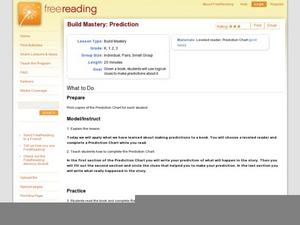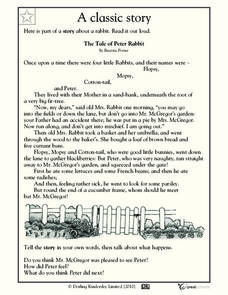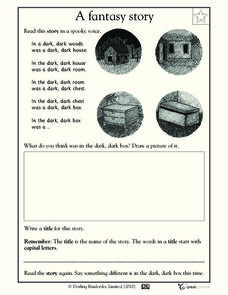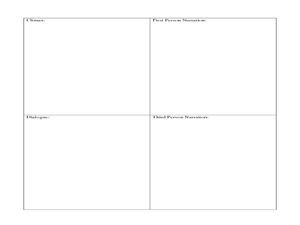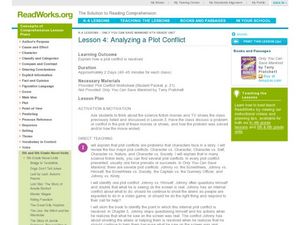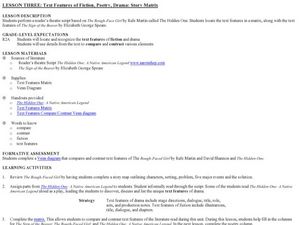Curated OER
Introduce Vocabulary: Matthew's Dream (Lionni)
Explore vocabulary in context with emerging readers using Leo Lionni's whimsical story Matthew's Dream, which you can find on YouTube if you don't have it. Kids expand their word base as you pre-teach the terms (appear, bleak, embrace,...
Curated OER
Introduce Vocabulary: Night Shift Daddy (Spinelli)
Do any of your budding readers have parents who work the night shift? Eileen Spinelli's book Night Shift Daddy, which can be found on YouTube if you don't have it, examines this family dynamic in a positive light and is an excellent...
Curated OER
Introduce Vocabulary: Some Birthday! (Polacco)
Patricia Polacco weaves an engaging tale for budding readers in her book Some Birthday!, an excellent resource for vocabulary in context. You can use this text to introduce the following words: investigate, snarl, and squawk. After a...
Curated OER
Introduce Vocabulary: George's Store at the Shore (Bassede)
Combine counting and vocabulary using Francine Bassede's book George's Store at the Shore, which has learners exploring new words and numbers 1-10. Suggested words for this text are: arrange, assortment, customers,...
Curated OER
Introduce Vocabulary: Tar Beach (Ringgold)
Anyplace can become a beach! Budding readers explore Faith Ringgold's world of imagination in her book Tar Beach, which can be found on YouTube if you don't have it. What words will budding readers learn? They focus on the following...
Curated OER
Introduce Vocabulary: Mama, Do You Love Me? (Joosse)
Barbara Joosse approaches an age-old question through an equally traditional culture in her story Mama, Do You Love Me?, which helps budding readers explore Native American vocabulary in context. Here you'll find instruction to teach the...
Curated OER
Introduce Vocabulary: Ruby the Copycat (Rathmann)
Have your scholars ever known someone who was a copycat? Approach this issue as you study vocabulary in context by reading Peggy Rathmann's book Ruby the Copycat. Proposed focus words are: recite, murmur, plop, and coincidence. Go over...
Curated OER
Daughters Come of Age in Women's Fiction
Introduce your young readers to fiction written by women authors. For each story, they explore the way these daughters discover and claim their own identities. Individually, class members use the literature to examine their role in their...
Curated OER
Summer of the Monkeys
While reading the book Summer of the Monkeys by Wilson Rawls, the class ties together the core reading objectives, which are making predictions, comprehending new information, reading for author's purpose, independence in reading, and...
Curated OER
Build Mastery: Sequencing
Writing a summary is much easier once you've laid out the sequence of events. Show readers how these two skills are intertwined using this graphic organizer. Review the meaning of sequencing first, presenting the chart and possibly...
Curated OER
Introduce: Prediction
What will happen next? Leave readers at a cliffhanger as they practice prediction strategies while listening to a story. Pupils start by making guesses based on the book's cover and title, discussing the techniques they use to make these...
Curated OER
Build Mastery: Prediction
What do you think will happen? Use a graphic organizer to help learners predict what will happen in a text. Consider modeling the chart using a familiar story, pretending you don't know what happens. Show scholars the book, explaining...
Great Schools
Different Types of Writing
What type of writing is this? Learners read a brief introduction to various types of text: instructions, explanations, poems, folk tales, novels, informative, and arguments. The introduction doesn't explain these, so consider going over...
Curated OER
Reading Practice: Peter Rabbit
Oh, that naughty Peter Rabbit! Youngsters read an excerpt aloud from the classic Beatrix Potter story "The Tale of Peter Rabbit." They retell the story in their own words and discuss the events. Readers make inferences about various...
Curated OER
Compare and Contrast Two Settings in One Text
Look for the signal words! Scholars get both instruction and practice comparing and contrasting. Although it is completely scripted, it can also serve as a detailed outline. Demonstrate this as you read a passage (included) and search...
Curated OER
A Fantasy Story: Spooky!
This creepy fantasy story needs an ending! Learners use a spooky voice to read a short story ending at an ellipsis...what was in the dark, dark box? They illustrate what they think could have been in there and write a title for the...
Curated OER
Reading Practice: Boris the Brainiest Baby
Boris is the smartest baby around! Beginning readers can use this short story excerpt to practice reading comprehension and fiction elements. They read the story and then discuss what they think he will do next. Scholars create an...
Great Schools
A Questionnaire: What Do You Like to Read?
What do your fifth graders know about types of fiction, nonfiction, and poetry? Find out as they fill out this questionnaire that requires them to list authors and texts that exemplify each genre. Not only will you be able to assess what...
Curated OER
Illustrating the Elements of a Story
Explore the elements of a story with this two-page graphic organizer. Readers write and draw descriptions of each element, including setting, plot, conflict, rising action, climax, dialogue, and narration.
Curated OER
Fiction and Nonfiction
Your emerging readers know not to judge a book by its cover, but they can categorize these titles into either fiction or nonfiction. There are four book covers pictured here, and scholars record the titles under the corresponding text...
Curated OER
Analyzing a Plot Conflict
Sixth graders analyze plot conflict with science fiction and TV programs. After discussing the conflict, they identify solutions for the programs selected. They examine Only You Can Save Mankind for conflict, and consider ways the...
Curated OER
Comprehension Instructional Routine: Sequence of Events in Text
If you're looking for a detailed instructional activity on event sequencing from informational text, you've found it. There is an entire script for you to draw from as you explore order of events and sequence words. Scaffolding is key...
Curated OER
Mystery Word Wall Game
Practice using words found on the classroom word wall, in vocabulary lists, or on spelling lists with your class. Young readers use clues to find the mystery word in the room. They can tally the points earned from identifying words...
Curated OER
Text Features of Fiction, Poetry, Drama: Story Matrix
How do novels differ from plays? Explore with your class the text features of fiction and drama by reading The Hidden One: Native American Legend and then performing a reader’s theater script based on the story. Class members create a...













